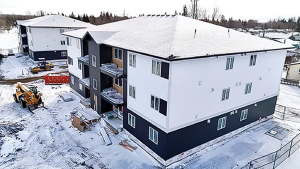The two-year grace period is coming to an end and extensive changes to Ontario’s building code kick in on July 1, 2005.
Key changes to Ontario's building code begin July 1
W.D. Lighthall
DCN Correspondent
The two-year grace period is coming to an end and extensive changes to Ontario’s building code kick in on July 1, 2005.
Legislation reforming Ontario’s building code was passed in September 2003. Because the reforms are extensive, the province set a two-year grace period giving the construction industry time to prepare for them.
Key changes coming to Ontario’s building code and related regulatory environment include:
•Municipalities will have the option of letting private companies known as Registered Code Agencies take over some aspects of code enforcement;
•Introduction of mandatory, standardized application forms for building permits;
• Establishing deadlines by which municipalities must issue building permit decisions; and
•Specifying which applicable laws must be met before a building permit is issued.
“For the most part, it’s good news for the builders and renovators in terms of streamlining and in terms of mobility. The building officials are significantly more impacted,” said Al Suleman, manager of building code interpretation with the Ministry of Municipal Affairs and Housing.
Also as of July 1 this year, new rules applying to building inspections come into effect.
“There are going to be mandatory obligations on the part of builders to notify the building department that you are ready for inspections of those items which are spelled out in the code, things like footings, insulation and framing,” said Suleman, at the 2005 Ontario Building and Renovation Forum, held last week in Markham. "In turn, the building within prescribed time-frames"
Suleman said defining all applicable laws relevant to building permit applications is an improvement because previously, this was an area with a fair bit of confusion based on differing opinions over which laws apply and which don’t.
“Now the building code is going to prescribe very specifically what applicable laws have to be met, and once you meet those laws, the permit cannot be denied. It adds clarity to the building code,” Suleman said.
Registered Code Agencies (RCAs) are private companies that will essentially take on the role of the municipality for building code enforcement.
Municipalities aren’t required to allow RCAs in their jurisdictions, it’s an option.
Suleman said in the interest of public safety, RCAs will have to meet extensive and stringent licensing and qualifying requirements.
“For the most part, the qualified individuals in the RCA will have the same powers and authority municipal inspectors have now. There are some limitations.
“For example, they cannot issue unsafe orders, that would continue to be the domain of municipal building officials,” Suleman said.
Homebuilders will be happy to know the new rules require municipalities to issue building-permit decisions for freehold houses within 10 days of receipt of application.
“If you don’t receive that decision, you have to be told why in writing. No more waiting six months for building permits,” Suleman said, noting different deadlines apply for more complex ICI buildings.
Sectors pleased
Both the residential and ICI sectors will be pleased to know that as of July 1, municipalities will be required to tie the cost of building permit fees to the cost of doing business.
The changes coming stipulate permit fees must be based on a municipality’s actual cost of maintaining building code enforcement and related administrative functions.
“No more can municipalities just increase fees without justification. They have to set their permit fees to reflect the cost of doing business. If they want to change permit fees, they have to have a public meeting,” Suleman said.
Wayne Dempsey, a builder based in Port Carling, Ont., and a former president of the Ontario Home Builders’ Association, said the new rules are good for his industry because they set qualification standards for professions where they previously didn’t exist.
“There’s a major gain for us, the building inspectors are going to have to meet certain qualification standards. For a long time they weren’t required,” Dempsey said.
He said the homebuilding industry has known for some time of the changes, so they won’t be a problem for builders who are informed about training and education matters.
“For those who just woke up in 2004 or 2005 and found they were a homebuilder, it’s going to be tough for them,” Dempsey said.
The Municipal Affairs and Housing website has extensive information on upcoming changes to the building code. You can also subscribe to the ministry’s email bulletin, Code News. Go to www.mah.on. gov.on.ca.
Find the Building Regulation link on the website’s main page, then find the link to Code News.
‘Now the building code is going to prescribe very specifically what applicable laws have to be met, and once you meet those laws, the permit cannot be denied’Al Suleman










Recent Comments
comments for this post are closed